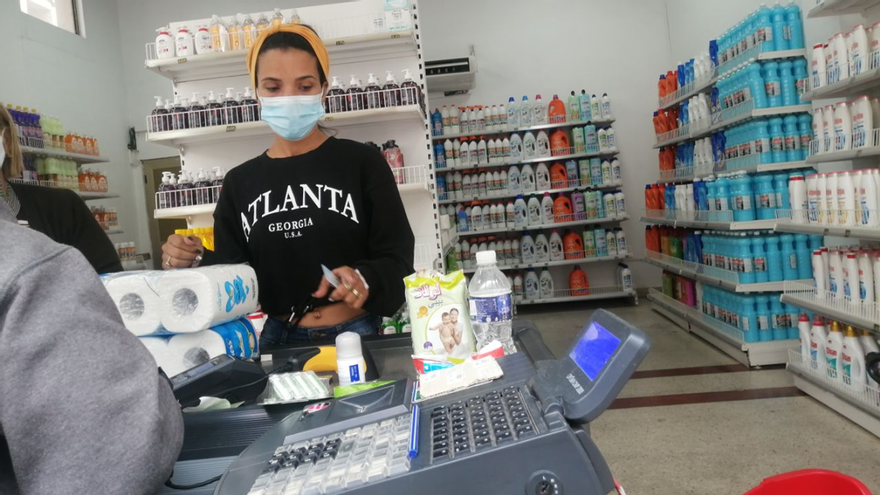
![]() 14ymedio, Havana, 3 December 2021 — The Minister of Economy, Alejandro Gil Fernández, announced in the Council of Ministers this week that there will be a “lifting of all entities that sell in MLC (freely convertible currency) without authorization.”
14ymedio, Havana, 3 December 2021 — The Minister of Economy, Alejandro Gil Fernández, announced in the Council of Ministers this week that there will be a “lifting of all entities that sell in MLC (freely convertible currency) without authorization.”
“It is not a decision of a company, from today to tomorrow, to put its sales in foreign currency. Here the foreign currency sales are approved, one by one, in the Executive Committee of the Council of Ministers,” said the head of the economy, visibly upset due to the growth of currency circulation on the black market and the distortions that this causes in the national economy.
“Can you think about the effects?” He said speaking to government staff, as seen in a report from the Noticiero. “First, where do they get the currency from? In the end they are buying it in the illegal market, they are paying state companies with MLC that they have not generated and, on the other hand, they are carrying that cost, that exchange rate in the illegal market in their prices, and the population is paying them. ”
Gil Fernández added that there is a perception in the population that it is practically impossible to obtain national products or services without dollars and for this they must be supplied in the illegal market, which contributes to triggering inflation. The minister argued that he understands that the country is going through a difficult time and that there are no hard currencies, but that it is not justified how they are being accessed.
The legal methods are, he recalled, exporting and trading with wholesale and retail stores authorized to sell in MLC. “We have asked companies to self-manage their currencies, but through established channels, not in any which way, and we are going to correct it,” he warned.
The economy minister explained that the 2022 Economy and Budgets plan contains the necessary corrections to attract foreign currency and do so legally and that what is currently happening “is not the design” that was made for retail sales in MLC. “There has been an intention to sell everything to the non-state sector in hard currency,” he argued.
Foreign currency stores began to expand at the end of October 2019 on the Island, first dedicated to the sale of household appliances and electrical equipment. The intention was to capture those dollars that many Cubans were going to spend on these products in countries like Panama or Mexico through mules who brought the equipment to Cuba.
But in the middle of last year the measure reached grocery stores and toiletries. At that time, Gil Fernández himself warned that the unpopular measure would be temporary and, although not desirable, necessary to solve the shortage of foreign currency (dollars, in reality) on the island.
Raúl Castro himself had to intervene this April when people were told that the country was not going to be dollarized and that it was only a matter of “encouraging remittances from abroad.” In addition, he assumed personal responsibility — despite being already theoretically removed from politics — for “an inadequate social communication policy and the publication of incorrect approaches in several of our press media.”
When this type of sale started, it was explained that there would be 72 establishments throughout the Island that would trade in this way, a tiny number compared to the 4,800 points of sale in the country. But the truth is that the number of stores in MLC has grown right before the eyes of the citizens, although the exact data of their official and unofficial number is unknown.
In addition, the number of products sold in these establishments has also increased and, although it is not strange to see foreign currency stores affected by the general shortage that affects the country, the possibility of purchasing goods in them is much greater than in stores that take payment in national pesos.
In addition, the number of products sold in these establishments has also increased and, although it is not strange to see foreign currency stores affected by the general shortage that affects the country, the possibility of purchasing goods in them is much greater than in stores in pesos.
In addition to the arbitrary decisions of state stores that impose payment in MLC without official authorization, many citizens are victims of scams committed by employees of some state-owned companies who take advantage of the facility to transfer MLC or pay with foreign currency through various applications for mobile phones.
This type of trick occurs, especially, with products such as beer, ice cream and soft drinks that are sold in very small quantities in national currency and to get them it is increasingly necessary to go to a market in MLC. The diminished supply that reaches the state gastronomic establishments ends up being resold by the employees themselves.
____________
COLLABORATE WITH OUR WORK: The 14ymedio team is committed to practicing serious journalism that reflects Cuba’s reality in all its depth. Thank you for joining us on this long journey. We invite you to continue supporting us by becoming a member of 14ymedio now. Together we can continue transforming journalism in Cuba.
